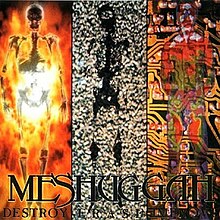Destroy Erase Improve
| Destroy Erase Improve | ||||
|---|---|---|---|---|
 | ||||
| Studio album by | ||||
| Released | 12 May 1995 | |||
| Recorded | February 1995 | |||
| Studio | Soundfront Studios (Uppsala, Sweden) | |||
| Genre | ||||
| Length | 46:31 | |||
| Label | Nuclear Blast | |||
| Producer | Daniel Bergstrand, Meshuggah | |||
| Meshuggah chronology | ||||
| ||||
| Review scores | |
|---|---|
| Source | Rating |
| Allmusic | |
| Pitchfork | 7.9/10[2] |
Destroy Erase Improve is the second full-length album by Swedish metal band Meshuggah. It was released on 12 May 1995 by Nuclear Blast. This is the first studio album to feature rhythm guitarist Mårten Hagström and the final to feature bassist Peter Nordin, as he left the band during the supporting tour due to vertigo.
Legacy[]
Describing the record as "one of the 90's definitive metallic works", Kevin Stewart-Panko argues that Destroy Erase Improve's unique fusion of genres amounted to a new "watermark" for heavy metal upon its release.[3] Metal critic Martin Popoff regards Destroy Erase Improve as the first clear demonstration of what would become the quintessential Meshuggah sound, wherein "stutter gun" riffs and "upset apple cart time signatures" are featured alongside "bone-breaking" percussion, an approach which resulted in considerable influence in the development of genres like mathcore and djent.[4] Popoff suggests that Destroy Erase Improve is the clear linchpin of Meshuggah's particular style, a "specific, nearly absurd proposal that only this band has dared to own."[5]
The album was ranked number 42 on Rolling Stone's 50 Greatest Prog Rock Albums of All Time list.[6] In 2017, Rolling Stone ranked Destroy Erase Improve as 77th on their list of 'The 100 Greatest Metal Albums of All Time.'[7]
Track listing[]
All lyrics are written by Tomas Haake, except where noted; all music is composed by Fredrik Thordendal, except where noted.
| No. | Title | Lyrics | Music | Length |
|---|---|---|---|---|
| 1. | "Future Breed Machine" | 5:48 | ||
| 2. | "Beneath" | 5:38 | ||
| 3. | "Soul Burn" |
| 5:17 | |
| 4. | "Transfixion" |
| 3:33 | |
| 5. | "Vanished" | 5:04 | ||
| 6. | "Acrid Placidity" | (instrumental) | Hagström | 3:15 |
| 7. | "Inside What's Within Behind" |
| 4:30 | |
| 8. | "Terminal Illusions" | Kidman | 3:47 | |
| 9. | "Suffer in Truth" | Kidman | Kidman | 4:19 |
| 10. | "Sublevels" | 5:14 | ||
| 11. | "Humiliative" (Japanese bonus track) |
| 5:15 | |
| 12. | "Ritual" (Japanese bonus track) | Kidman | Kidman | 6:15 |
| 13. | "Gods of Rapture" (live, Japanese bonus track) | 4:55 |
Personnel[]
Meshuggah[]
- Jens Kidman – lead vocals
- Fredrik Thordendal – lead guitar, rhythm guitar, synthesizers
- Mårten Hagström – rhythm guitar
- Tomas Haake – drums, voices
- Peter Nordin – bass
Production[]
- Daniel Bergstrand – mixing, engineering, production
- Fredrik Thordendal – mixing
- Meshuggah – production, cover design
- Peter In De Betou – mastering (at Cutting Room, Stockholm)
- Stefan Gillbald – cover artwork
References[]
- ^ https://www.allmusic.com/album/destroy-erase-improve-mw0000174601
- ^ https://pitchfork.com/reviews/albums/22142-25-years-of-musical-deviance/
- ^ Stewart-Panko, Kevin (2009). Mudrian, Albert (ed.). Precious Metal: Decibel Presents the Stories Behind 25 Extreme Metal Masterpieces. Da Capo Press. p. 213. ISBN 9780306818066.
- ^ Popoff, Martin (2003). The Top 500 Heavy Metal Songs of All Time. ECW Press. p. 342. ISBN 1550225308.
- ^ Popoff, Martin (2004). The Top 500 Heavy Metal Albums of All Time. ECW Press. p. 305. ISBN 1550226002.
- ^ "50 Greatest Prog Rock Albums of All Time". Rolling Stone. 17 June 2015. Retrieved 31 August 2015.
- ^ http://www.theprp.com/2017/06/21/news/rolling-stone-share-choices-100-greatest-metal-albums-time/
- 1995 albums
- Meshuggah albums
- Nuclear Blast albums